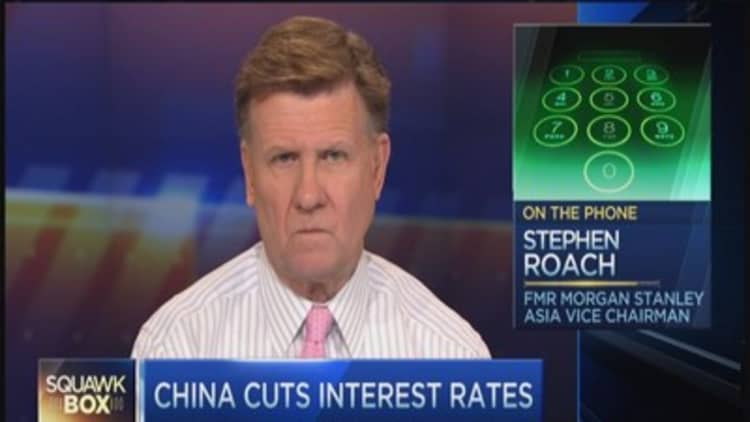
After unexpectedly cutting interest rates for the first time in two years, Chinese leaders have revealed their floor for economic growth is around 7 percent, said Stephen Roach, senior fellow at Yale's Global Affairs Institute.
The move also signals investors can expect further moves if China fears the growth rate will go appreciably below 7 percent, the former chairman of Morgan Stanley Asia said Friday on CNBC's "Squawk Box."
In a surprise announcement Friday, the People's Bank of China said it was cutting one-year benchmark lending rates by 40 basis points to 5.6 percent. It also lowered one-year benchmark deposit rates by 25 basis points. The changes take effect Saturday.
The rate cut is seen as addressing slowing factory growth and a stalled property market, which have dragged down the broader economy.
Read More
China is addressing cyclical changes while also fixing big structural issues in its economy, something that no other economy is doing right now, Roach said.
"There are headwinds associated with that when you try to shift the mix of economic growth from your hyper-growth sectors of investment—debt-intensive investments and exports—to services and internal private consumption," he said.
"There's some slowing associated with that, and when that occurs in the context of much weaker external environment, which is obviously the case given what's going on in the world, China's got downside pressures to contend with," Roach added.
The hyperbole about China being an ever-ticking debt bomb stacked with excesses and nonperforming loans is based on emotion rather than empirical data, he said.
Read MoreThese Chinese brands may become household names
Growth below 7 percent will remain acceptable so long as China can continue to generate jobs and reduce poverty, an area where the country is doing better than people realize, he said.
Last year, the country's growth slowed to 7.7 percent and China still added 13 million jobs to its urban centers, Roach said. It is creating more jobs this year despite slower economic growth by shifting to more labor-intensive services, he added.
Roach said fiscal stimulus on the level of 2008 and 2009 is unlikely given that it created problems in terms of debt, exposure to off-balance-sheet local government financing vehicles, and a property overhang.
"They feel pretty strongly they don't want to go back to the well and do that," he said. "Given the leeway they have on monetary policy, with lending rates still around 5½ percent and consumers the focus of their policy initiatives right now, I think they'd much prefer to do it with respect to monetary policy."
—Reuters contributed to this report.


